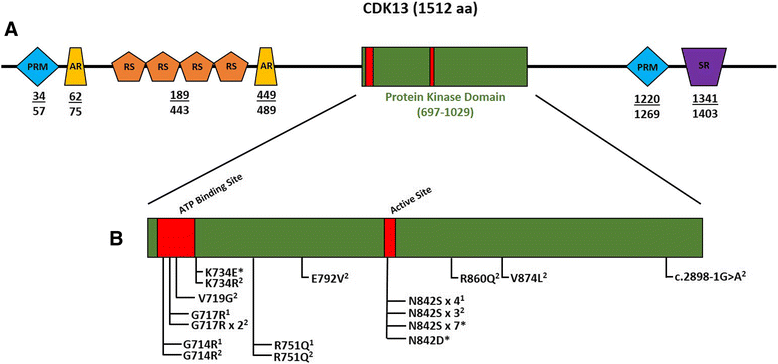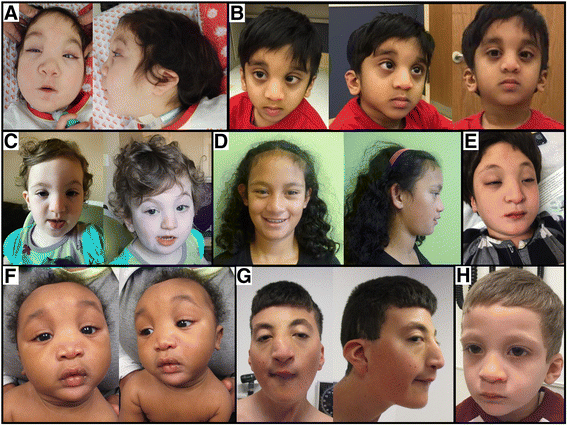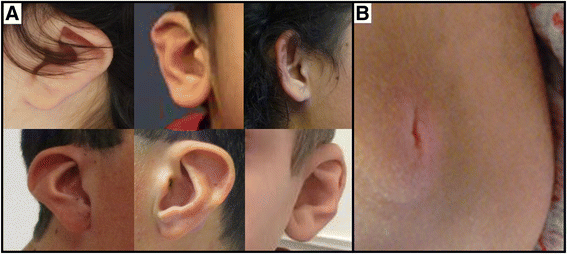Phenotypic and molecular characterisation of CDK13-related congenital heart defects, dysmorphic facial features and intellectual developmental disorders
- PMID: 28807008
- PMCID: PMC5557075
- DOI: 10.1186/s13073-017-0463-8
Phenotypic and molecular characterisation of CDK13-related congenital heart defects, dysmorphic facial features and intellectual developmental disorders
Abstract
Background: De novo missense variants in CDK13 have been described as the cause of syndromic congenital heart defects in seven individuals ascertained from a large congenital cardiovascular malformations cohort. We aimed to further define the phenotypic and molecular spectrum of this newly described disorder.
Methods: To minimise ascertainment bias, we recruited nine additional individuals with CDK13 pathogenic variants from clinical and research exome laboratory sequencing cohorts. Each individual underwent dysmorphology exam and comprehensive medical history review.
Results: We demonstrate greater than expected phenotypic heterogeneity, including 33% (3/9) of individuals without structural heart disease on echocardiogram. There was a high penetrance for a unique constellation of facial dysmorphism and global developmental delay, as well as less frequently seen renal and sacral anomalies. Two individuals had novel CDK13 variants (p.Asn842Asp, p.Lys734Glu), while the remaining seven unrelated individuals had a recurrent, previously published p.Asn842Ser variant. Summary of all variants published to date demonstrates apparent restriction of pathogenic variants to the protein kinase domain with clustering in the ATP and magnesium binding sites.
Conclusions: Here we provide detailed phenotypic and molecular characterisation of individuals with pathogenic variants in CDK13 and propose management guidelines based upon the estimated prevalence of anomalies identified.
Keywords: Agenesis of the corpus callosum; CDK13; CHDFIDD; Cyclin-dependent kinase; De novo variant; Developmental delay; Hypertelorism; Neurodevelopmental disorders; Undiagnosed Diseases Network.
Conflict of interest statement
Ethics approval and consent to participate
The institutional review board of the Baylor College of Medicine approved this study. Participants were enrolled after written informed consent was obtained from parents or legal guardians. The study conforms to the Helsinki Declaration.
Consent for publication
Written informed consent for publication from the parents or legal guardians to publish the work was obtained.
Competing interests
Baylor College of Medicine (BCM) and Miraca Holdings Inc. have formed a joint venture with shared ownership and governance of the Baylor Genetics (BG), which performs clinical exome sequencing. JEP, MM, JAR, JRL, BL and SRL are employees of BCM and derive support through a professional services agreement with the BG. JRL serves on the Scientific Advisory Board of the BG. JRL has stock ownership in 23andMe, is a paid consultant for Regeneron Pharmaceuticals, has stock options in Lasergen, Inc. and is a co-inventor of US and European patents related to molecular diagnostics for inherited neuropathies, eye diseases and bacterial genomic fingerprinting. The remaining authors declare that they have no competing interests.
Publisher's Note
Springer Nature remains neutral with regard to jurisdictional claims in published maps and institutional affiliations.
Figures



Similar articles
-
De novo variants in CDK13 associated with syndromic ID/DD: Molecular and clinical delineation of 15 individuals and a further review.Clin Genet. 2018 May;93(5):1000-1007. doi: 10.1111/cge.13225. Clin Genet. 2018. PMID: 29393965
-
Heterozygous mutations affecting the protein kinase domain of CDK13 cause a syndromic form of developmental delay and intellectual disability.J Med Genet. 2018 Jan;55(1):28-38. doi: 10.1136/jmedgenet-2017-104620. Epub 2017 Oct 11. J Med Genet. 2018. PMID: 29021403 Free PMC article.
-
Deciphering congenital heart defects, facial dysmorphism and intellectual developmental disorder (CHDFIDD) associated with constitutional CDK13 pathogenic variants - case report and literature review.Ann Agric Environ Med. 2024 Mar 25;31(1):147-150. doi: 10.26444/aaem/175610. Epub 2023 Dec 7. Ann Agric Environ Med. 2024. PMID: 38549490 Review.
-
Redefining the phenotypic spectrum of de novo heterozygous CDK13 variants: Three patients without cardiac defects.Eur J Med Genet. 2018 May;61(5):243-247. doi: 10.1016/j.ejmg.2017.12.004. Epub 2017 Dec 6. Eur J Med Genet. 2018. PMID: 29222009
-
CDK13-related disorder.Adv Genet. 2019;103:163-182. doi: 10.1016/bs.adgen.2018.11.001. Epub 2018 Dec 11. Adv Genet. 2019. PMID: 30904094 Review.
Cited by
-
Novel pathogenic variants and multiple molecular diagnoses in neurodevelopmental disorders.J Neurodev Disord. 2019 Jun 25;11(1):11. doi: 10.1186/s11689-019-9270-4. J Neurodev Disord. 2019. PMID: 31238879 Free PMC article.
-
CDK13-Mediated Cell Cycle Disorder Promotes Tumorigenesis of High HMGA2 Expression Gastric Cancer.Front Mol Biosci. 2021 Aug 26;8:707295. doi: 10.3389/fmolb.2021.707295. eCollection 2021. Front Mol Biosci. 2021. PMID: 34513922 Free PMC article.
-
Bi-allelic TMEM94 Truncating Variants Are Associated with Neurodevelopmental Delay, Congenital Heart Defects, and Distinct Facial Dysmorphism.Am J Hum Genet. 2018 Dec 6;103(6):948-967. doi: 10.1016/j.ajhg.2018.11.001. Am J Hum Genet. 2018. PMID: 30526868 Free PMC article.
-
Wolfram-like syndrome with bicuspid aortic valve due to a homozygous missense variant in CDK13.J Hum Genet. 2021 Oct;66(10):1009-1018. doi: 10.1038/s10038-021-00922-0. Epub 2021 Apr 21. J Hum Genet. 2021. PMID: 33879837 Free PMC article.
-
Structural insights into the functional diversity of the CDK-cyclin family.Open Biol. 2018 Sep;8(9):180112. doi: 10.1098/rsob.180112. Open Biol. 2018. PMID: 30185601 Free PMC article. Review.
References
-
- Liang K, Gao X, Gilmore JM, Florens L, Washburn MP, Smith E, et al. Characterization of human cyclin-dependent kinase 12 (CDK12) and CDK13 complexes in C-terminal domain phosphorylation, gene transcription, and RNA processing. Mol Cell Biol. 2015;35(6):928–38. doi: 10.1128/MCB.01426-14. - DOI - PMC - PubMed
Publication types
MeSH terms
Substances
Grants and funding
LinkOut - more resources
Full Text Sources
Other Literature Sources
Medical
Molecular Biology Databases

